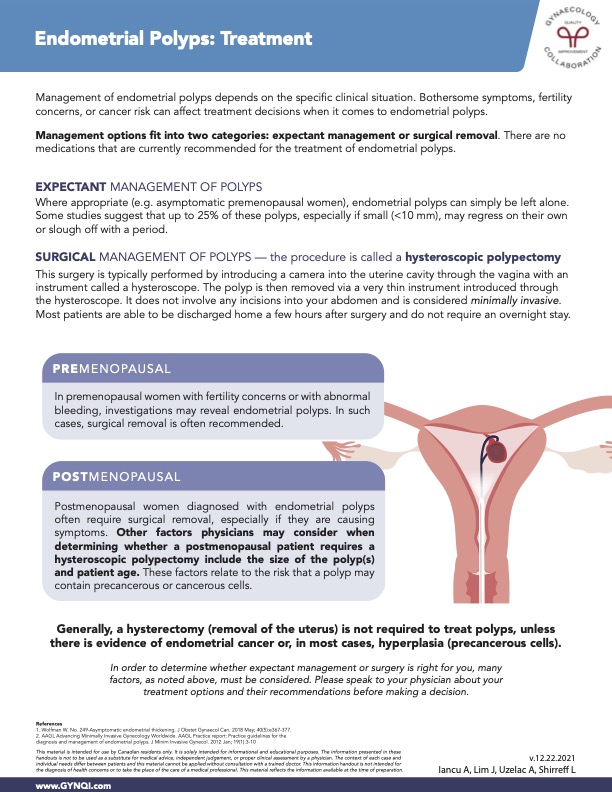
Table of Contents
- Summary
- Management Options for Endometrial Polyps
- Expectant Management of Polyps
- Surgical Management of Polyps
- Hysterectomy
- Menopause and Polyps
- Premenopausal
- Postmenopausal
- Treatment Options and Considerations for Endometrial Polyps
Summary:
- Management of endometrial polyps is customized to each patient’s symptoms, fertility issues, and cancer risk, ensuring a tailored approach to their specific health needs.
- Treatment options include expectant management for asymptomatic cases and surgical removal via hysteroscopic polypectomy for symptomatic patients or those at higher risk.
- There are currently no approved medications for endometrial polyps, emphasizing the reliance on surgical or monitoring approaches.
- It is crucial to consult with a healthcare provider to determine the best treatment plan based on individual health factors and risks.
Endometrial polyp management is personalized based on symptoms, fertility goals, and cancer risk. Options include expectant management, suitable for some asymptomatic premenopausal women, or surgical removal through a minimally invasive hysteroscopic polypectomy. A hysterectomy is rarely necessary unless cancer or precancerous changes are detected.
While no medications are available, treatment decisions should be made with a doctor’s guidance, considering individual health factors and risks.
Management Options for Endometrial Polyps
The management of endometrial polyps is tailored to the individual clinical scenario. Treatment decisions may be influenced by bothersome symptoms, fertility concerns, or the potential risk of cancer.
Management options for endometrial polyps fall into two categories:
- Expectant management
- Surgical removal
Currently, there are no recommended medications for treating endometrial polyps.
Expectant Management of Polyps
In certain cases, such as in asymptomatic premenopausal women, endometrial polyps may be left untreated.
Some studies indicate that up to 25% of these polyps, particularly those smaller than 10mm, may spontaneously regress or be shed during menstruation.
Surgical Management of Polyps
The procedure, known as hysteroscopic polypectomy, involves the insertion of a camera into the uterine cavity through the vagina using a device called a hysteroscope. A thin instrument is then used to remove the polyp through the hysteroscope.
This minimally invasive surgery does not require abdominal incisions and most patients are able to go home just a few hours after the procedure and typically do not need to stay overnight.
Hysterectomy
A hysterectomy (removal of the uterus) is generally not necessary for treating polyps unless there is evidence of endometrial cancer, or in most cases, hyperplasia (precancerous cells).
To determine whether monitoring or surgical treatment is appropriate, it’s essential to consider various factors specific to your health. Be sure to discuss your options and your doctor’s recommendations thoroughly before deciding on a treatment plan.
Menopause and Polyps
During both premenopause and menopause, hormonal changes can lead to the development of endometrial polyps, which may cause symptoms like irregular bleeding or affect fertility.
Routine scans can also reveal polyps, with your doctor taking certain factors into account in terms of treatment.
Premenopausal
In premenopausal women with fertility concerns or with abnormal bleeding, investigations may reveal endometrial polyps. In such cases, surgical removal is often recommended.
Postmenopausal
For postmenopausal women diagnosed with endometrial polyps, surgical removal is often recommended, especially if symptoms are present. Physicians also consider factors such as polyp size and patient age when determining the need for a hysteroscopic polypectomy, as these can indicate a higher risk of precancerous or cancerous cells.
Treatment Options and Considerations for Endometrial Polyps
The management of endometrial polyps is individualized, taking into account symptoms, fertility goals, and cancer risk. While expectant management may be suitable for asymptomatic premenopausal women—particularly for small polyps that may regress naturally—surgical removal through a minimally invasive hysteroscopic polypectomy is often recommended for symptomatic or higher-risk cases.
Since each case is unique, it’s essential to discuss all treatment options with your doctor to choose the best pathway forward.



